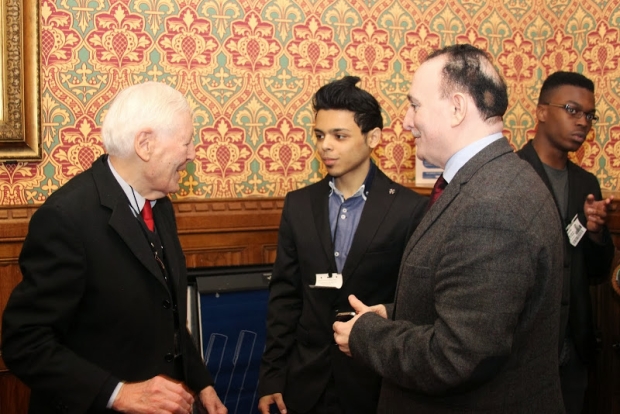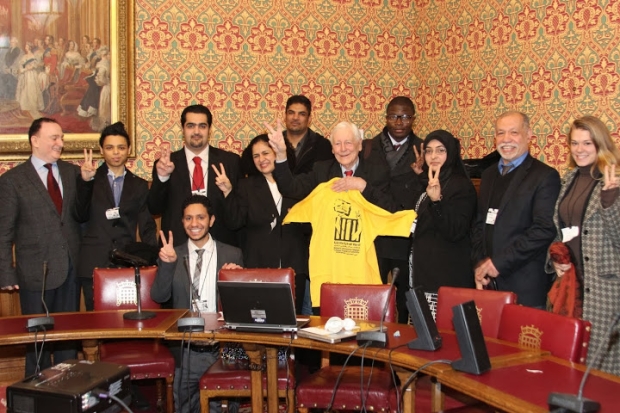UK to deport seriously ill Bahrain activist who claims he will be tortured
A seriously ill Bahraini man fears he will be killed when he is deported to the Gulf state next week, after his UK asylum application was turned down by British authorities.
Ali Isa Hasan, 26, fled to the UK in November 2011 out of fear he was going to be imprisoned and tortured in Bahrain for taking part in pro-democracy protests against the ruling al-Khalifa royal family.
News of Hasan’s imminent deportation, set for 10 November, comes after British Foreign Secretary Phillip Hammond attended a ceremony to announce the opening of a new UK naval base in Bahrain.
Conservative MP Alan Duncan said on Monday that Bahrain is an example of “openness and tolerance” and claimed that the Khalifas do not deserve their reputation of treating Shia Muslim Bahrainis as “second class” citizens.
Four years ago, however, the Hasan family arrived in London seeking shelter from a crackdown against their Shia community by Bahraini authorities seeking to quell popular calls for democratic reforms. Ali Hasan’s father, step-mother, half-brother and half-sister were all granted asylum soon after arriving in September 2011.
The Home Office had accepted that Hasan’s father, Mohammed, who lost his job as a university professor for taking part in the Arab Spring-inspired protests, would have been at risk of persecution if deported to Bahrain.
Hasan travelled separately from the rest of his family and arrived in the UK two months later in November. After applying for asylum Hasan was moved to government provided housing in Liverpool, separated from his family in London. In 2013 he moved to the capital when his application was rejected by the Home Office, leaving government housing to be with his family and fight his appeal to stay in the UK.
Official court rulings seen by Middle East Eye show that Home Office staff have argued that when they interviewed Hasan in 2011, he gave inconsistent statements and failed to provide evidence of his activism in Bahrain.
Hasan’s father says that his son “grew up in a political house” and has always been passionate about challenging power.
“He lived in an atmosphere where me and my father (Hasan’s grandfather) would always be talking about problems with the government,” said Mohammed Hasan. “He always wanted to be like us – going to opposition demonstrations. Now he just wants a safe place to live where he can finish his education in political economy.”
Hasan has tried to maintain his activism and, in London, has joined up with the exiled Bahraini opposition and attended numerous protests and events.
He has been photographed and videoed taking part in panels that have openly criticised and called for the overthrow of the monarchy. His lawyers say this puts him at serious risk of being mistreated in Bahrain, where there continue to be reports of government critics being locked up and tortured.
Hasan has been hospitalised four times in the UK as a result of his condition. A medical report carried out on 13 October and seen by Middle East Eye shows that he has gallstones and an enlarged spleen.
Dr Tamara Joffe at the Kilburn Park Medical Centre said: “I am extremely worried to hear that Ali may be deported back to Bahrain where he risks incarceration and torture. This would be worrying for anyone but with an illness such as sickle cell anaemia, Ali’s life is clearly at even greater risk should he be deported.”
The seriousness of Hasan’s condition means that a solitary blow to his abdomen could rupture his spleen and kill him, Joffe said.
Arden Solicitors, who represent Hasan, said they have exhausted all avenues of appeal, but they claim that the Home Office has not considered an important piece of new evidence.
The law firm ordered a psychological assessment of Hasan that was finished on 12 October. The report, which has been seen by Middle East Eye, was not considered by the Home Office because the High Court rejected a new appeal application in September.
The report says Hasan is suicidal and has reported “hearing voices”, which consultant psychiatrist Dr M H Husni describes as anxiety caused by his imminent deportation to Bahrain. The doctor said Hasan is suffering from severe depression and recommended he undergo cognitive behavioural therapy.
“If he were to be removed from the UK to Bahrain, he would attempt and can complete suicide,” Dr Husni said, in the report.
'I would rather die'
Hasan has been held at Tinsley House immigration removal centre near Gatwick Airport since the High Court threw out his last ditch appeal application in September.
The Home Office was due to deport him at the beginning of October, but suspended his removal until 10 November because a doctor was not available to accompany him on the flight to Bahrain – a legal requirement for individuals with serious medical conditions.
Middle East Eye agreed a visit to see Hasan at Tinsley House on 29 October, but for undisclosed reasons the Home Office cancelled the appointment.
In a telephone interview Hasan told Middle East Eye that he “would rather die [at Tinsley House] than be sent back to Bahrain”.
“They will torture and kill me in Bahrain. I won’t go back,” he said.
Hasan said he has no ties in Bahrain because his sole remaining family members – his grandfather and aunt – have moved to the United Arab Emirates after they were allegedly harassed by Bahraini authorities.
Arden Solicitors criticised the Home Office for a lack of “compassionate consideration” for Hasan’s personal circumstances.
“His vulnerability and medical condition have not been taken under any consideration,” said solicitor Leqa al-Habib. “When he initially made the application they (the Home Office) should have made concessions on the basis that this applicant has a quite unique story.”
A Bahraini human rights activist blamed the Home Office decision to reject Hasan’s application on an “obsession with meeting immigration targets”.
“The Home Office is failing to meet its humanitarian obligations,” said Sayed Alwadaei, director of advocacy at the London-based Bahrain Institute for Rights and Development. “Under no circumstances should asylum claimants under the slightest risk of torture or ill treatment be forcibly deported back to Bahrain, a country infamous for torture.”
Alwadaei cited the case of Husain Jawad, an activist whose UK asylum application was turned down and returned to Bahrain in November 2014. In February this year, Jawad was arrested and detained for three months by Bahraini authorities. He claims he was tortured while in prison.
Home Office statistics show that it is extremely rare for a Bahraini to be forcibly removed from the UK. Figures published in June this year show that since the 2011 protests 121 Bahrainis have applied for asylum in the UK, with the majority of applicants being accepted.
Only one Bahraini in the past three years - and seven in total since 2011 - have been forcibly removed from the UK.
A Home Office spokesperson said they "do not routinely comment on individual cases" but did defend the UK's record in accepting asylum seekers.
"The UK has a proud history of granting asylum to those who genuinely need it and every case is carefully considered on its individual merits," the spokesperson said.
New MEE newsletter: Jerusalem Dispatch
Sign up to get the latest insights and analysis on Israel-Palestine, alongside Turkey Unpacked and other MEE newsletters
Middle East Eye delivers independent and unrivalled coverage and analysis of the Middle East, North Africa and beyond. To learn more about republishing this content and the associated fees, please fill out this form. More about MEE can be found here.






